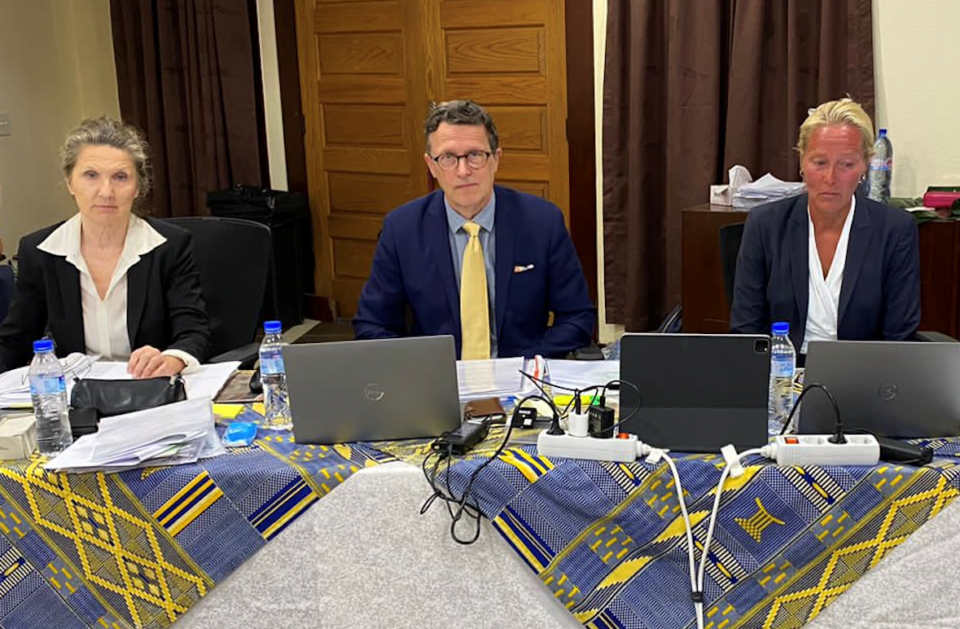As Finnish Appeals Court End Hearings In Liberia
PHOTO: Finland’s Turku Court of Appeal travelled to Liberia to hear witnesses in Gibril Massaquoi’s acquittal hearings. Credit: Forgbe Kloh/New Narratives.
By Forgbe Emma Kloh with New Narratives
MONROVIA, Liberia—An ex-protection officer for the UN-backed Special Court for Sierra Leone has rejected allegations that a national of that country violated the Court’s “safe house rules” and came to Liberia to commit murder, rape, torture, and other atrocious acts.
“Defense 8” told Finland’s Turku Court of Appeal on Tuesday that as a “high profile witness,” Gibril Massaquoi was always guarded by protection officers.
He said even if Massaquoi did need to go out, the officers were with him.
“He went out only with requests from the court,” said Defense 8. “Massaquoi did not go out by himself. If he had a request to go to the office to meet with the lawyers, we (protection officers) took him.”
The issue has been a major theory of this marathon trial. Prosecutors have argued that Massaquoi, a former commander of the Revolutionary United Front (RUF), sneaked out of the safe house, where he was as an informant for the Special Court, and came to help Liberian government’s troops battle rebels from the Liberians United for Reconciliation and Democracy, who had advanced on the country’s capital in an attempt to remove from power, Charles Taylor the President at the time. They have alleged that during that time, Massaquoi committed massacres, including at Waterside in Monrovia. But Massaquoi and his lawyers successfully argued in the Pirkanmaa Court District of Tampere that it was impossible for him to have left the safe house because of the high security protocols. The Court found for Massaquoi a year ago. But prosecutors said it got it wrong, thus setting the stage for these appeal hearings. They have lied up over five dozen witnesses, including people claiming to be relatives of those allegedly killed or ordered killed by Massaquoi, to solidify their argument. Some witnesses, including individuals claiming to have fought alongside Massaquoi in Sierra Leone, have denied the charges against him—saying although he came to Liberia, it was for “peace purposes.” Unlike the District Court, the Appeal Court could not travel to Sierra Leone to listen to witnesses, mainly for the defense, because the government there did not approve the Court’s travel. So, the Court is returning to Finland to listen to testimonies from some witnesses and then return to Liberia in May to hear those witnesses from Sierra Leone.
But even before the Court’s departure, Massaquoi’s lawyers are calling witnesses to strengthen their argument of alibi for their client, especially about the allegation of breaching rules of the safe house.
“We ran different shifts,” Defense 8 said. “We had three duties: the morning, afternoon, and the night shifts.”
“No. It was even risky for him because he was a protection witness and the doors were always locked,” the witness said on direct examination about the possibility of Massaquoi’s escape at night. “His colleagues from the RUF would have killed him, so it was not possible for him to leave.”
But the Court wanted to know whether Massaquoi’s brother, who often travels to Sierra Leone from Finland, coached, or coerced the witness to testify in favor the former RUF spokesman.
“It was late last year (2022) that I met him, while at my office,” the witness said. “He said he passed just to greet me.”
The witness also admitted speaking to Massaquoi.
“I can’t remember the time, but we spoke recently.”
It remains to be seen whether prosecutors, who have raised the red flag about every issue in the case, will also make a cause about the call.
The day’s second witness, “Defense 18,” who claimed to be a sister of Gibril said he was with her all throughout her campaign for the chieftaincy title in Sierra Leone between 1999-2002.
“Massaquoi was the master planner and he used to provide vehicles for my campaign,” Defense 18 said. “He used to draft report on the gains and challenges and how to address them. He did not come to Liberia all through the years we were together.”
The coverage of the appeal of Massaquoi’s acquittal is a collaboration with New Narratives as part of the West Africa Justice Reporting Project.

